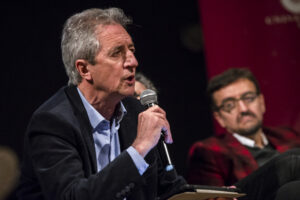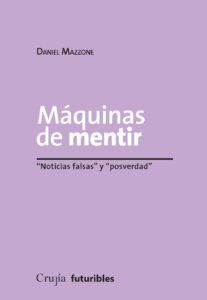Daniel Mazzone was one of the first South American journalists and professors to propose a change of perception about disinformation: the need to establish a new communication contract between the media and digital society in which journalists adopt a new attitude about disinformation in order to fight it. In his book Máquinas de mentir [Lying machines] (2018), the media and digital platforms researcher from Uruguay analyzes the new challenges society faces as a result of lies and other disinformation circulating online. Mazzone was formerly a professor of Digital Journalism and Academic Coordinator of Journalism at ORT Uruguay University. LatAm Journalism Review (LJR) interviewed him about what he envisions as the new role of journalists in this age of disinformation.

Uruguayan journalist Daniel Mazzone, author of "Máquinas de Mentir [Lying machines]" (Courtesy / School of Communication and Design, ORT University, Uruguay)
Daniel Mazzone: Journalism provides hundreds of proposals that no one can say in a conclusive way "this is the absolute truth" or "this other one is." These are daily proposals [or pitches] society absorbs and ends up making its own decisions. For instance, the example of Odebrecht, one of the most representative cases of corruption in Latin America. It was approached in different ways. It is hard to say "this is the official truth on this issue" and pass down a sentence on it. Journalism elaborates and re-elaborates new versions that are perfected and then legitimized by society.
I believe it’s a mistake to treat disinformation as if it were part of the information discourse. Disinformation is the falsification of facts. It’s a discourse in-and-of-itself that distorts and invents a reality. This leads us to discuss an agenda that focuses on denying statements, we run to verify news, and thus all public and journalistic attention is diverted from the real agenda and the problems to be addressed by society in our countries. The so-called disinformation, we are facing it poorly, we are getting lost in it. Our job as journalists is to present society with different proposals of the truth and then society validates them. It is a back-and-forth.
LJR: In your book you deconstruct the concept of post-truth as applied to journalism. What is that about?
DM: The term "post-truth" is intended to characterize a situation in which blatant lies went viral from the unprecedented possibilities of social media, to finally be declared as falsehoods. The damage done in a few hours by the viral lie is infinitely greater than a modest debunking. The truth is the truth that is amassed daily in open, democratic societies where people carry out a referendum with the media, analyze, read, and come to conclusions. Today something profound is at stake and it’s the credibility of an age-old western communication system. Truth is an agreement we reach as a society and it’s fundamentally built by journalism. Without freedom we could not do that. News is a journalistic genre that sparks many intermediate decisions, it’s a complex professional process with editors, media brands, and it disqualifies someone from doing that to transmit false information. It totally diverts our attention to say there’s fake news and run after it.
LJR: Does journalism lose its production quality in this never-ending task of disproving and checking fake news?
DM: Of course. And there are examples. The ones that went the furthest down that road are The New York Times and Washington Post when they counted Donald Trump's lies. There were several dozen a day! The problem is that journalism has not understood the problem and the magnitude. We did not find allies to combat the fabrication of facts. Journalism cannot do it alone. Politics and political communication are the largest source of supply of fabrications. We, as journalists, are faced with the dilemma that we must give those who fabricate facts the same chance as those who speak valid facts, and then we end up giving them the status of "source." That leads us to amplify the fabrications of that source. American media are still asking themselves: Should we cover Trump on all the facts and statements he produces if we know he is lying? This policy of fabricating facts should be considered criminal, insofar as it leads society to listen to a discourse that is not honest, to consider situations and distortions of facts that are going to lead society to make bad decisions. There has to be an updating of the norms that allow democracy to get rid of these figures for whom traditional democracy is no deterrent.
LJR: Who’d be the social actors allied to journalism who can help fight disinformation?
DM: Politics should be an ally of journalism; it should be an ally of the information industry that today sits alone, being punished from all sides, especially by the digital platforms that took away its primary financing mode. Today, traditional journalism is trying to survive as best it can, news outlets are being closed, how many societies and communities were left without any media? Today we discuss the dangers of Artificial Intelligence but the fabrication of facts is more serious because it enhances the problems of disinformation if we do not figure it out.
LJR: You talk about the importance of renewing the contract between society and journalism in this era of digital platforms, a pact that was lost due to an excessive circulation of texts. What would the renewal of that communication contract look like today?
M: Today we are without a contract. Historically, the editorial communication contract in industrial society had four basic pillars — city, industry, democracy and the media. But at the beginning of the 21st century, with the digital era, this pact went into crisis. Today, digital platforms displace the media, the moderation of public discourse and public conversation is no longer in the hands of journalists. Digital platforms began to distribute articles and information in the midst of an astronomical flood of texts. Information is distributed on the platforms. The media had a close and central commitment to democracy and institutions, the platforms do not have that commitment, they are only committed to their shareholders. This is a serious problem. Journalism has to come back to moderating public conversation, to rescue that role and fulfill it to the letter, because otherwise, we’ll continue to drift.
LJR: And those platforms compete with journalism professionals.
DM: That's what they want… Platforms wanted the media to publish news directly on them [the platforms] to grab their audiences, but they’re not interested in content. That is why I insist: journalism must tell journalists not to publish directly on the platforms because what the platforms want is to take the audiences you build.

Book "Máquinas de mentir" by Daniel Mazzone. (Courtesy / Editorial La Crujía)
LJR: How do you imagine a new contract between the media and the platforms?
DM: There are clear movements within the electronic society to re-found a new communication contract. For example, the fines imposed by regulatory bodies on digital platforms, [such as] Europe's digital services law that forces them to take responsibility for hate speech and misleading publications. Attempts in Australia, Canada and France to make platforms pay the media for the news they use in their news feeds. There’ve been attempts that have not yet solidified together organically. We are in a battle.
LJR: How can we reestablish a communication contract between journalism and society in our region?
DM: By talking to society. Recently, in Catamarca, a province in Argentina, we organized meetings of journalists in front of the public. We talked about journalism and justice, society, and disinformation. We aim to build networks. That is to say, journalism must dare to open the door and show the audience– the people– our difficulties, what we are going through. Latin America must have a voice to speak in the world. We cannot continue to be a sounding board for the U.S. and Europe.
LJR: In your book Máquinas de mentir [Lying machines], you also analyze fact-checking as prevention and not as remediation. How do you see it today?
DM: When I wrote that chapter, fact-checkers were breaking in. It was 2018. We can't sell society that we do fact-checking now. We always did. And now it seems to have been given a name and a function, as if what is written should be subjected to a truth check. We cannot delegate to society the question of whether what we publish is true or not. We have to tell people "what I’m giving you is true and is ratified by us, journalists." There can be no doubt about something published because then we are telling them not to believe anything. It’s as if an airline company sold you a ticket and told you that the flight is departing, but it can’t tell you if it’ll arrive.
LJR: Let's talk a bit about university education in journalism. In this new reality of digital platforms, there have been continuous readaptations of curricula. In your experience as a university professor, what would you change in those programs?
DM: In communication schools at universities, we need a theoretical framework aligned more with Mac Luhan, the founder of media studies. We have to begin to understand communication and investigate it in a multidisciplinary way; journalism should be devoted to understanding society. And, on the other hand, we must stop talking about digital journalism, which is an anachronism. Today’s society is digital. Cyberspace has been added to the territoriality in which we’ve been operating since the industrial era. It is not that society is now cyberspace. It is territoriality and cyberspace, both at the same time. Everything is digital and we also write by hand with a pen. Nothing is lost, everything is added. We are an age-old machinery of accumulation and what we have achieved is not lost. That’s why today Artificial Intelligence is one more step, nothing more. New steps will come until infinity and we’ll continue adding and re-signifying.